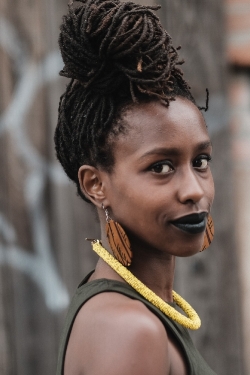When I was younger, I was a proud tomboy. My boyish frame and the masculine way I carried myself aided in my camouflage. But as I became a teenager, I was struck by puberty. Suddenly, I noticed not only did my body change, but the way people perceived it and spoke about it, especially older boys and men, changed as well. It made me feel uncomfortable. If my body was my home, I could now not just live in it, I had to use my clothing as a security system.
Growing up distanced from femininity and conventional standards of beauty gave me a limited (and misguided) understanding of what femininity was and what it meant to walk around femme presenting. From the outside, femininity to me was about being ‘pretty’ and having other people recognize it in a positive way. Femininity and conventional beauty were a benefit, something to be coveted. It was good attention, and it was always wanted and deserved. For all people knew of my tomboy self I didn’t care about such things, but deep down, I began to tie my negative personal esteem as a girl to my masculinity.
I thought femininity would be a saving grace, but I didn’t have the courage to abandon the safety of non-recognition I found in masculinity.
As I got older, I didn’t have a choice. No amount of tomboying could hide me from being read as ‘woman’, and I was secretly glad I had been inducted into the young woman body and the beauty it possessed through puberty. This transition that I thought would give me more autonomy over my body actually made me a target in ways I had never perceived and often times don’t think can be perceived or understood in the same way by people who are not women, femme or feminine presenting.
I soon was taught that sometimes, the only person who thinks a girl’s/woman’s body is her own, is that girl/woman. From the halls of middle school to the words I hear from parents of the youth I work with, I’ve constantly been told I need to hide my body in order to be a ‘good girl/woman’, to be a good mentor or teacher, to not be distracting, etc. And, at times, I listened mostly because I was too exhausted to keep fighting for the right to live in a body I was born into. The more I present as femme, the more I have to fight for my basic right to be in my body as I see fit. But I now realize it is a fight I have to fight not just for myself, but for the young women I work with, for the people whose eyes I never see but are on me. Though I understand safety is a consideration, when we choose to hide ourselves, we lie about who we are and what it means to live fully in our bodies.
Mwende "FreeQuency" Katwiwa
Photo by Paa Yanfu Kwesi
Mwende "FreeQuency" Katwiwa is a 26 year old Black Queer Immigrant writer & storyteller from Kenya living and loving in New Orleans. A 2017 TEDWomen speaker and ranked 3rd at the 2015 Individual World Poetry Slam, FreeQuency is an internationally touring author, host, youth-worker, social-justice lecturer, teaching artist and workshop leader who has spent her life at the intersection of arts, education and activism. You can view her work at www.freequencyspeaks.com.

